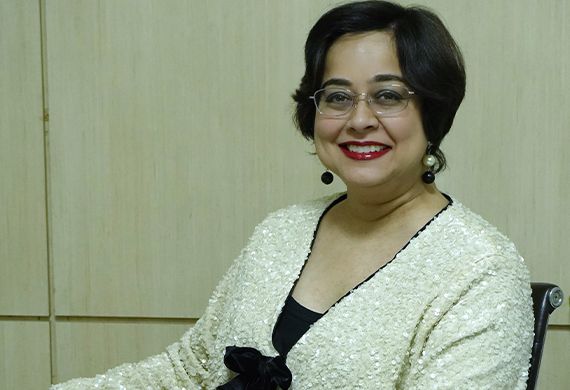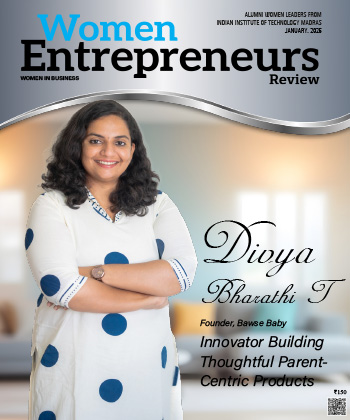
Rooted in Learning & Driven by Impact: Multidisciplinary Insights from a Woman Leader
By: Anila Rattan, Head of School, Hospitality & Tourism Management, Vedatya Institute
Anila Rattan, Professor and Head of the School of Hospitality & Tourism Management at Vedatya Institute. With over 26 years of experience in adult learning, leadership development, and executive coaching, she brings a wealth of knowledge to her role. With a background in hospitality, travel, fashion, healthcare, IT, and financial services, she has a Diploma in Hotel Management, a Diploma in Teaching and Training, and is an ICF Professional Certified Coach.
The Women Entrepreneurs Review team recently spoke to multifaceted leader, trainer, and author Anila Rattan. From hospitality operations to corporate training and psychometric assessments, to heading a retail training company, to entrepreneurship and learning & development consulting, to an executive coaching practice, being an author, and now academia, she has worn many hats. Anila draws insights from her multidisciplinary expertise and makes a strong case for constant growth and learning. In the conversation, she shares her thoughts on the elements of corporate training in the academic space, embedding sustainability, entrepreneurship, and community engagement.
Here are excerpts from the conversation.
What drives you to constantly reinvent yourself professionally?
The urge to learn drives me. My professional journey has been self-guided, and I have had very good mentors at every stage of my career. I am intrigued by the human brain, and even though I am a commerce student who went further to do a hospitality course at the IHM, I soon realized the activity in my job description that I most enjoyed was understanding people and training my team. That prompted me to move into the learning and development department at Taj ManSingh Delhi from front office operations. I flourished there, and I realized where my passion lay. From there onwards, I have ensured that a large part of my job description involves people. I have been lucky that I have always gotten the opportunity to experiment and learn new things. A strong belief that I hold is lifelong learning, and throughout my professional journey spanning across 29 years, I have focused on acquiring competence in the space that most interests me.
As the head of the school, how do you design learning to meet both industry expectations and personal transformation for students? How do you embed being 'future-ready' for the students in the Vedatya curriculum?
My professional journey across hotel operations, corporate roles, and entrepreneurship was dynamic. It had equipped me to shape learning that balances industry relevance with personal growth. It allows me to bridge the gap between theory and real-world application, making learning both practical and transformative. Most importantly, it gives me the ability to benchmark academia with global corporate learning practices.
At Vedatya, over the past two years, I have introduced elements of corporate training into the academic space, focusing on communication, executive presence, and a strong service mindset. All these qualities are essential in hospitality leadership.
Our mission at Vedatya is to create industry-ready & high-performing lifelong learners with contemporary knowledge, skills, and attitudes, and our core values (learner centricity, solution orientation, compassionate leadership, and pursuit of excellence), coupled with Vedatya’s 25-year legacy, lie in creating future-ready professionals. Our curriculum blends academic rigor with experiential learning. From hospitality labs to our organic farm, fishpond, and poultry unit, and it goes on, the campus itself is a living classroom. Students engage deeply with sustainability, systems thinking, and community impact.
Our initiatives, like the drip irrigation, waste management, and eco-conscious operations, aren’t peripheral; they are integral to our pedagogy. These experiences prepare students not just for jobs but for leadership in a dynamic, responsible, and global hospitality industry.
India's hospitality sector is evolving fast. How do you see the changing trends shaping the global narrative? Can they boost sustainability and local community engagement?
The hospitality sector is evolving at breakneck speed, and keeping up by responding to changes in the industry is a constant endeavor. What’s encouraging is that many of these changes are aligned with global priorities: sustainability, experiential travel, and community-centric models.
In India, we are seeing a growing emphasis on eco-friendly practices, local sourcing, and authentic cultural experiences. This not only enhances the guest experience but also empowers local artisans, farmers, and communities.
These trends are shaping a new narrative where hospitality goes beyond service to become a platform for positive impact. At Vedatya, we prepare students to lead in this new era by embedding sustainability, entrepreneurship, and community engagement into our curriculum. We want them to graduate not just as professionals, but as responsible changemakers contributing to a global, future-forward hospitality industry.
As a PCC-certified coach, how do you navigate resistance in senior leaders during coaching interventions? How does it differ when applied to mid-level teams?
Navigating resistance is a nuanced process. With over 500 hours of executive coaching, I have learned that deep, non-judgmental listening is the key. When individuals feel truly heard, resistance begins to dissolve. The core principles remain the same across levels. What changes is how they’re applied. With senior leaders, it's often about creating space for reflection; with mid-level teams, it’s about building trust and relevance.
Your belief in L&D projects and business impact focuses on key business drivers. Can you share an example where L&D directly contributed to a measurable business outcome?
At Vedatya, we are currently working on an industry-academia joint research project on the impact of foot health on employee efficiency and productivity. It’s an example of learning, research, and real-world business outcomes intersect.
This initiative was born from observing challenges among students that forced us to look at data for hospitality employees, where high fatigue and attrition levels among operational staff in hospitality roles were reported.
Through targeted awareness sessions, preventive care training, and ergonomic interventions, we are measuring shifts in productivity, absenteeism, and overall well-being.
This is how L&D can address overlooked but critical drivers of business performance. When learning is tied to real data and operational realities, the impact is not only measurable but transformative.
Can you throw light on the significant initiative 'WomenLead'? What inspired you to create it, and what changes do you hope can make it even more powerful?
Back in 2016, during Women’s Day, I had a conversation with my then business partners, Lovely Kumar and Geetika Saxena. Our conversation turned to the biases and barriers we had faced in our professional journeys and what we had managed to overcome, and where we had struggled. One of us said, “There must be so many women like us who face the same dilemmas but don’t have the support system we do.” That moment gave birth to WomenLead.
Today, it’s a growing network of over 500 women leaders across industries, geographies, levels, and functions. They are all united by the shared goal of supporting one another professionally. It has grown slowly but organically, fueled by real conversations and genuine connections.
I am currently very happy with how WomenLead is shaping up. Going forward, I would love to see more structured mentoring, cross-industry collaborations, and platforms for young women professionals to access the wisdom and strength of this network.
Your book, The Alchemy of Coaching, focuses on first-time managers. How do you help first-time managers shift from being contributors to empowering leaders?
The key shift is moving from doing the work to enabling others to succeed. By learning coaching principles and developing those skills, managers can become what we call a manager coach. This approach helps them listen actively, ask powerful questions, and build accountability. It is about empowering their teams rather than directing them. It’s about leading with curiosity, not control.
What is one piece of advice that you want to share with the readers?
Listen with focus if you want to learn.
Listening skills are one thing that we are not taught in school or college, and yet are the most critical life skill.
Most Viewed
- 1 Women's Health Startup HerMD Closing Doors Amid Industry Challenges
- 2 5 Famous Women in Indian Armed Forces
- 3 Saudi Women No longer Require Male Permission for Clothing Choices, says Prince MbS
- 4 Kolkata Medtech Startup Innovodigm Raises Rs 5.5 Crore Seed Funding Led by IAN Group
- 5 Yamunanagar's Kashish Kalra Honoured after Securing 111th Rank in UPSC Civil Services Exam
- 6 Madurai Appoints Its First Woman Corporation Head
- 7 IAS Vijayalakshmi Bidari Appointed as the new Nagpur Divisional Commissioner
- 8 American Entrepreneur Lucy Guo Overtakes T Swift to become Youngest Female Billionaire
- 9 ICC Women's World Cup 2025 Trophy Showcased at Indore's Holkar Stadium
- 10 Aparna Saxena's Beauty Venture AntiNorm Launches in India
- 11 Vidya Nataraj Co-Founded BlueStone Jewellery & Lifestyle files IPO
- 12 5 Women Freedom Fighters of India
- 13 Dr. G Krishnapriya appointed as CEO for Trichy
- 14 M3M & Sirona Partner to Introduce Menstrual Hygiene Vending Machines in 15 Locations
- 15 Punjab Govt launches SHE Cohort 3.0 Supporting Tech-led Women Startups
- 16 Indian origin Lawyer, Sweena Pannu appointed as the US New Superior Court Judge
- 17 The Aurora Tech Award recognizes 4 Indian Women-led Startups
- 18 Kerala's Republic Day parade featured an all-female tableau
- 19 Manisha Kabbur Becomes Karnataka's First Woman International Karate Coach
- 20 Director K. S. Ravikumar's Daughter Maalica Ravikumar Launches Life Coaching Company 'Evergrowth Academy' for Women
- 21 Leezu's Raises Pre-Seed Funding to Accelerate Growth in Sexual Wellness Industry
- 22 Sattu: Super-easy summer drink for PCOS gut healing
- 23 Swathi Nelabhatla creates Sitha App, India's First Women-Exclusive Gig Platform
- 24 7 Timeless Female Kathak Dancers & their Iconic Legacies
- 25 Meet 7 Iconic Women Architects of Modern India & their Most Impactful Work
- 26 This Woman-led Insuretech Startup is Helping Bridge the Education Financing Gap in India
- 27 Women Leaders Share Lessons Learnt from India Women's WC Win
- 28 5 Enterprising Women Founders Powering Singapore's Tech & Innovation Landscape
- 29 4 Women. 4 Stories. One Vision for Smarter, Stronger Healthcare
- 30 Global Gender Gap Narrows to 68.8%, But Full Equality 123 Years Away: WEF Report 2025
- 31 Changemakers: 7 Women Entrepreneurs Taking the Make in India Movement Forward
- 32 Meet Lucy Guo, The Youngest Self-Made Female Billionaire Disrupting Tech
- 33 How Women are Driving India's Festive Online Shopping Surge






